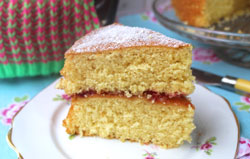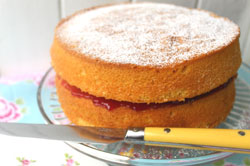
This is the classic tea-time sponge cake made with xylitol instead of standard sugar. Xylito has less than half the calories of sugar and is actively good for your teeth. See below for more about xylitol.
It's sandwiched with fruit spread rather than jam.
-
175g (6oz) plain flour
- 1 level teaspoon bicarbonate of soda
- 2 level teaspoons cream of tartar
- 175g (6oz) softened butter
- 175g (6oz) xylitol
- 3 eggs
- 2 tablespoons milk
Good quality fruit spread
Finely ground xylitol, to finish
Preheat oven to (160C fan ovens) or equivalent
Butter two 18cm (7 inch) loose bottomed sandwich tins

Add the raising agents to the weighed flour.
Whiz the butter and xylitol together in a food processor until light and fluffy.
Sieve the flour and raising agents in carefully and add the eggs.
Whiz again. Add the milk and whiz until very smooth and glossy and everything is well mixed.
(You may need to scrape the mixture down from the sides a couple of times with a flexible spatula.)
Pour into the prepared cake tins.
Bake in the middle of the oven for 18-20 minutes or until the cakes are risen and golden and a skewer inserted comes out clean.
Allow the cakes to rest for a few moments and then carefully loosen the edges with a small palette knife: they should be starting to contract away from the sides of their own accord.

Transfer to a cooling rack.
Once the cakes are cool, sandwich with fruit spread and sieve finely ground xylitol over the top (grind a teaspoon of xylitol in an old-fashioned pestle and mortar to a fine powder).
What is Xylitol?
The recipes in ‘Cakes from the Tooth Fairy’ written with the help of
my brilliant dentist, Murray Hawkins, (the recipes, minus the Tooth
Fairy herself, were later published more boringly as ‘Sugar Free
Baking’) all use xylitol rather than sucrose (standard sugar from cane
and sugar beet) as a sweetener.
It is very easy to bake with as it’s like for like weight wise with
sugar so you simply use the same quantity of xylitol as you would sugar:
see Baking with Xylitol below for more details.
Xylitol is a naturally occurring substance found in wood and maize.
It has several beneficial properties. Whereas sucrose actively promotes
dental decay xylitol inhibits it. It does this in three ways.
Firstly it inhibits streptococcus mutans-the acid producing bacteria which is primarily responsible for tooth decay.
Secondly it encourages calcium absorption and therefore
remineralisation of enamel which has been softened by the action of acid
producing bacteria.
Thirdly it inhibits the production of plaque.
In addition to its dental benefits Xylitol also has several medical benefits.
It contains 40% less calories than sucrose and is absorbed across the
gut wall much more slowly than sucrose. It is therefore of benefit to
those attempting to control their weight and to sufferers of diabetes.
Because it promotes the uptake of calcium across the gut wall it helps protect the body from osteoporosis.
Xylitol also increases the activity of neutrophils-the white blood
cells which fight bacterial infections-increasing the bodies ability to
fight off winter colds.
Xylitol has no known toxicity in humans and is safe for use by
pregnant women. One study showed that regular consumption of xylitol by
pregnant women reduced the probability of transmitting streptococcus
mutans (the decay causing bacteria) from mother to child by 80%.
The only side effect of xylitol consumption is that if consumed in
large quantities it does have a laxative effect. However, the laxative
effect of xylitol is only one tenth that of sorbitol.
Warning for Pets
Although beneficial for humans, much like chocolate and grapes,
xylitol is not suitable for dogs - in fact, it is not advisable for any
animal so please keep anything made with xylitol, and xylitol itself,
for human consumption only. If you suspect your dog has taken xylitol
please consult your vet immediately.
Baking with Xylitol
Xylitol can be used in the same way as regular sugar and comes in
granulated form. Xylitol works perfectly for most baking but there are a
couple of areas where it isn’t suitable.
Since it inhibits the growth of yeast it doesn’t work for yeast-based baking.
It doesn’t caramelise either, so, for example, you couldn’t top a
crème caramel with it. Your cakes will be golden brown when they come
out of the oven, though, as the other ingredients will still brown
nicely.
The best xylitol is still made from birch bark, although some brands
are now made from corn husks. Try to buy xylitol made from birch bark if
you can, such as Total Sweet, it really is of superior quality.
Look for brands such as Total Sweet (see above) which is easily
available: you should be able to find it in the sugar and sweeteners
section of supermarkets or online.